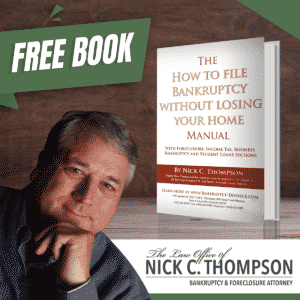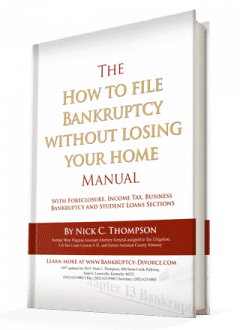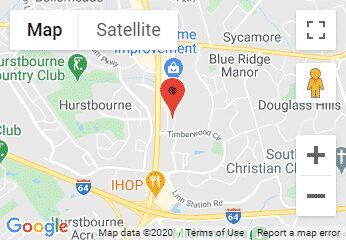If you need to stop a Property Tax foreclosure, bankruptcy may be your best option. The sheriff has the obligation to collect the tax with interest. When you don’t pay property taxes, investors purchase the property taxes and then foreclose under KRS section 134. Often debt collection attorneys purchase tax liens by setting up a company that purchases the property tax lien. Then they charge $250 per hour for attorney fees or more when the company forecloses.
In effect, they buy the tax debt, earn 12% interest plus thousands more in attorney fees and costs when they file the foreclosure. By failing to pay the taxes on time the homeowner becomes victim to what in 2021 is a 250 to 350 per hour lawsuit to collect the tax. One client had to pay 9,742.78 in interest and attorney fees over a two year period for a 2,161.26 property tax bill. The most common solution for many homeowners is to file a Chapter 13 which repays this over up to 5 years. This stops the attorney fees from accruing.
Property Tax Foreclosure Bankruptcy Louisville Commissioner
If you fall behind in the insurance or property taxes, the lender will often pay the property taxes for you. However, taxes and forced placed insurance is repaid at a higher rate than you may have usually paid. Being behind on taxes or insurance often places you in foreclosure from the mortgage company. It is normally a part of the note, that not paying the insurance or taxes is a default which can trigger foreclosure. Even if you are current on the mortgage payments, the mortgage company can foreclose for nonpayment of the taxes and insurance.
The county can also foreclose on a tax debt. But it usually takes years before enough taxes pile up for the county to foreclose. Instead, these debts are typically bought up by investors and the mortgage company because they can make 12% plus added fees from it. It is the Jefferson County Commissioner who holds the sale.
How to solve property tax foreclosure, bankruptcy Chapter 7 or 13.
Your budget has to include property taxes and insurance for your home. If you forget to budget for this, you have to fix the problem. If you simply need to get rid of unsecured debts, which prevent you from paying taxes on time a Chapter 7 can free up cash. By improving your cash flow, you can apply money to the property taxes and pay it off. Sometimes a simple Chapter 7 is enough. But remember, in Chapter 7, you are limited in the amount of equity you can keep in a home. Chapter 7 also avoids a tax and a deficiency debt.
Bankruptcy may be your only option when you are facing an immediate property tax foreclosure. Chapter 13 might be required to stop the sale. It can give you up to five years to pay off the taxes. Chapter 7 will delay the sale for about 4-6 months. Chapter 13 payments might be small, but your budget must include paying these taxes, or you will eventually go back into another foreclosure for the same reason. Paying back taxes in a 13 requires you to pay the interest during what is often a five-year plan. Chapter 13 gives you time but not if you return to not paying the property taxes.
Property taxes are statutory taxes.
Because property taxes are statutory taxes, you can’t strip or discharge the tax in bankruptcy. You can only repay property taxes, whether they are owned by the county, mortgage company, or an investor. Property tax liens attach to the home or real property just like a super first mortgage, which must be paid even before the first mortgage is paid. Tax liens place the mortgage company at risk if these taxes pile up. Property taxes are paid before judgment liens in a foreclosure.
Property tax liens cannot be avoided or stripped in bankruptcy court. They can only be repaid. But you can repay them over time, and unsecured debts may be paid far less. For instance, if you have property taxes and a first mortgage, there may be no equity for a second mortgage. If the second mortgage has no equity, the lien may be stripped, and the balance is treated as unsecured and discharged.
Only tax liens and residential first mortgages are protected in bankruptcy from being stripped or modified. A rental or vacation home can have a first mortgage modified if it is not fully secured. Chapter 13 gives you the following abilities:
- Repay the property tax liens over time.
- Eliminate other debts.
- Sometimes strip a mortgage.
- Protect a comaker.
You never lose a home to the trustee in Chapter 13.
One of the beautiful things about Chapter 13 is how you never lose property to the court or a trustee. In Chapter 13, people may not make the home mortgage payments or plan payments and have a home go back to foreclosure. But they don’t lose a house just because they had too much equity. Instead, if you have too much equity, the monthly payment is normally increased. The plan has to repay secured and priority debts in full. But it also must repay as much as a Chapter 7 would have.
Income taxes less than three years old are priority debts. The payments may be too high if you have substantial property or secured and priority debts. But you are never forced to turn over property in Chapter 13.
An experienced attorney will put together a budget designed to include future property taxes. Even if there are unexpected changes, you can modify the plan. The goal of the plan is to eliminate the unsecured debt, and at the end of the plan, you have caught up all of the secured debt, including the property taxes.
 Resources for Bankruptcy
Resources for Bankruptcy
Louisville Kentucky Bankruptcy Forms
Home Foreclosure after Chapter 13 Bankruptcy
How to Get Money Back from a Commissioner Foreclosure Sale
Kentucky Commissioner Foreclosure Sales Costs, Fees
Learn About Louisville Short Sales
Are you facing foreclosure? Then, you are in the right place because I am here to help you. So, contact my office right away to start the conversation. Nick C. Thompson, Bankruptcy Lawyer: 502-625-0905.






